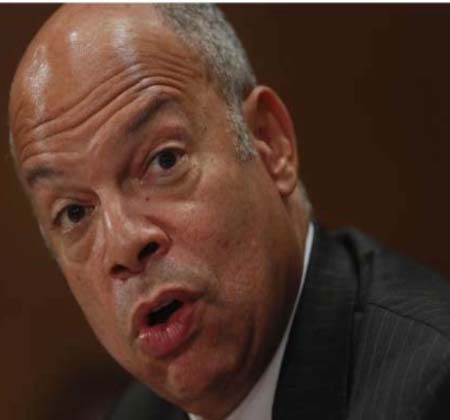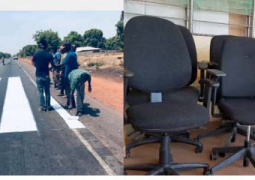
The
United States has finally decided to pull the trigger against the Gambia
Government and will deny visas to some Gambians hoping to visit the U.S., the
Statement Department said on Saturday 1st October 2016.
This,
according to the State Department, followed the Gambia’s refusal to accept
nearly 2000 people the US is trying to deport.
Homeland
Security Secretary Jeh Johnson took the decisive move after years of prodding
by lawmakers on Capitol Hill, signing a letter triggering the law that requires
a halt in visas to countries that are refusing to accept their own citizens.
Under the law, the State Department had no choice but to comply.
The
move comes at a time when Democratic presidential nominee Hillary Clinton is
facing criticism for allowing a major backlog of criminal aliens to build up
during her tenure as secretary of state. Republican rival Donald Trump has said
she made the U.S. less safe by refusing to force other countries to cooperate.
In
this new case, State Department officials said they informed the Gambian
government of the move on Saturday.
“As
of October 1, 2016, the U.S. Embassy in Banjul, The Gambia has discontinued
visa issuance to employees of the Gambian government, employees of certain
entities associated with the government, and their spouses and children, with
limited exceptions,” a State Department official said.
The
law appears to call for an even broader response — the denial of visas to all
Gambian citizens. But stripping government officials and their families of
visas is still a powerful lever. The only time it’s been used before, against
Guyana in 2001, it produced full cooperation in less than two months.
An
official from the Gambian embassy in Washington recently told The Washington
Times that as many as 1,800 of their citizens were in the backlog. He suggested
the U.S. pay to have Gambian immigration authorities come to the U.S. to review
them — though he insisted his country is trying to cooperate.
“Our
country respects the laws of the United States and we are working closely with
the U.S. authorities to take care of the situation,” Hamba Manneh, counselor at
the Gambian embassy, said.
The
administration’s move marks the first time it has used Section 243(d) of the
immigration code, and it comes as both Democrats and Republicans have called
for the U.S. to get tough on foreign countries that don’t take back their
citizens.
More
than 30,000 Cubans — the vast majority with criminal records — are awaiting
deportation but have been released onto the streets in the U.S. because Cuba
refuses to take them back. China is another major offender, placing high on the
list of nearly two dozen recalcitrant countries identified by Homeland
Security.
The
Gambia is ranked 11th on that list, according to Jessica Vaughan, policy
studies director at the Center for Immigration Studies.
She
said there’s now a major hurdle to cooperating: most of the Gambians awaiting
deportation have been released onto the streets — including hundreds with
criminal records — so tracking them down to deport them could be difficult.
“If
The Gambia agrees to take back their criminals, how will ICE find them if most
of them are at large?” she said.
Sen.
Charles E. Grassley, who first revealed the move against The Gambia on Friday,
said it was about time the administration targeted someone. He said he hopes
more countries face the same punishment if they don’t begin to cooperate, and
he said if The Gambia doesn’t straighten out, he hopes the U.S. broadens the
visa sanctions to more than the government.
“It’s
time we make clear to these nations that blocking U.S. deportation efforts by
refusing to take back their citizens has consequences,” said Mr. Grassley,
chairman of the Senate Judiciary Committee.
The
problem of countries refusing to take back their own citizens has been around
for years, but it came into sharp focus earlier this year when a Haitian man
was convicted of killing a young woman in Connecticut. That man, Jean Jacques,
had previously served time for attempted murder but was out on U.S. streets
because Haiti wouldn’t take him back, saying it questioned whether he really
was Haitian.
That’s
the same excuse given in tens of thousands of other cases where home countries
refuse to take back their citizens — including The Gambia.
Without
proof of citizenship, many countries refuse to issue travel documents,
thwarting Homeland Security’s deportation plans.
In
2001, when the Bush administration pulled the trigger on denying visas to
Guyana, it was wildly successful. Of a backlog of 113 immigrants, 112 of them
were processed and deported within two months, and the U.S. quickly lifted its
punishment.
Source:
Washington Times



